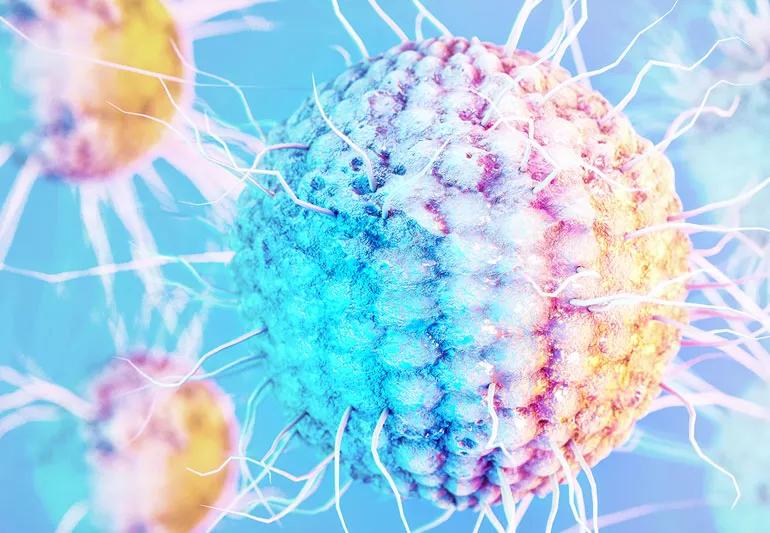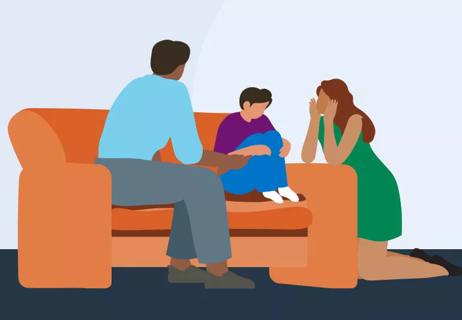It’s not just smoking and genetics that can increase your risk of cancer

The truth is doctors and scientists don’t know what causes most types of cancer. Yes, some lifestyle behaviors, like smoking, can increase your risk. Hereditary factors sometimes play a role, too, like if breast cancer runs in your family.
Cleveland Clinic is a non-profit academic medical center. Advertising on our site helps support our mission. We do not endorse non-Cleveland Clinic products or services. Policy
And sometimes — in rare circumstances — cancer can be triggered by a virus.
It doesn’t happen in most people, says medical oncologist Dale Shepard, MD, PhD. But viruses can cause some cancers, particularly in people with high-risk behavior like:
No. Cancer can be the result of a virus altering the genetic code of your cell’s DNA.
And it’s not just any virus that can trigger cancer. It’s only the viruses that affect certain types of cells in your body. And even then, it’s only in certain cases, explains Dr. Shepard.
Here’s how a virus may cause cancer:
Most viruses, like those that cause colds and flu, never get to step 4.
“Viruses that infect your lungs and airways, for example, don’t stay in your body for long,” says Dr. Shepard. “Even if the virus enters your airway cells and attaches to your DNA, your immune system will get rid of those faulty cells quickly. However, cells in other areas of your body, like your liver, don’t refresh as fast. Infections in those cells can become more dangerous.”
There are few viruses that have been linked to cancer. Yet some of them are quite common.
This virus is best known for causing mononucleosis (mono). Most people in the U.S. will get EBV at some point, whether or not they actually get sick. EBV will stay in your body for life, usually not causing problems.
However, EBV can sometimes trigger a type of lymphoma, cancer of the lymphatic system.
While there’s no vaccine for the Epstein-Barr virus, you can limit your exposure by not sharing personal items, food, drinks or kissing someone who has it.
These viruses spread through contact with infected blood and having sex with a person who is infected. People with these viruses have hepatitis or an inflamed liver. If the infection lasts a long time, it can permanently damage your liver, called cirrhosis. Cirrhosis can lead to liver cancer.
While medication can help get rid of hepatitis C, medication for hepatitis B doesn’t cure it. It can help lower the chances of liver damage and liver cancer.
There is a vaccine available for hepatitis B.
This virus is spread mostly through saliva, but may also be spread through sexual contact or blood. While it doesn’t cause symptoms in most people who have it, it can cause Kaposi sarcoma, especially in people with a weakened immune system.
Practicing safe sex by using condoms and limiting your number of sexual partners can lessen your chance of becoming infected with human herpes virus 8.
HIV is spread through contact with infected blood and having unprotected sex with a person who is infected. While best known for causing AIDS, HIV infects white blood cells and weakens your immune system. That increases your risk of all kinds of diseases, including cancer.
HIV is linked with Kaposi sarcoma, lymphoma, head and neck cancers, and anal cancer.
There are ways to limit your chances of becoming infected with HIV. Use a condom during sex and don’t share needles used for drugs. There are also HIV prevention medications available.
This virus can infect your skin or mucous membranes. Sometimes, it causes genital warts. You can catch HPV through sexual activity, and most sexually active people have at least one HPV infection during their lifetime.
Usually, your immune system will get rid of the infection, but sometimes, HPV can cause cervical cancer. It also can cause some head and neck cancers, like throat cancer.
“It’s unclear why these viruses react differently in different people,” says Dr. Shepard. “There’s no way of knowing who might get cancer because of a viral infection.”
HPV vaccines are available, are effective and should be discussed with your doctor to see if you qualify.
The best way to protect yourself from virus-induced cancer is to protect yourself from getting the virus in the first place. That includes avoiding high-risk behaviors like having unprotected sex and sharing needles.
Just as important is getting proper vaccinations, stresses Dr. Shepard. Vaccines are available for hepatitis B and HPV.
“These vaccines can significantly decrease your risk of infection, so they really do impact your cancer risk,” he says. “Although there are no vaccines for hepatitis C and HIV, we now have medications that can minimize the amount of virus in your body if you do get infected.”
Learn more about our editorial process.

Working has its benefits, but it may require some modifications — and that’s OK

Studies show the high health cost of spending hours in a chair

It’s important to share the news in an honest and age-appropriate way

If menopause symptoms disrupt your life, HRT can help, with minimal cancer risk

Research shows some associations and concerns, but no definitive connections

Research doesn’t show a link between the personal hygiene product and breast cancer

When nutritious foods are hard to come by, your health can suffer

It’s important to watch for and guard against conditions like heart disease and cancer

Your metabolism may torch 1,300 to 2,000 calories daily with no activity

A gentle touch in all the right places may help drain your sinuses